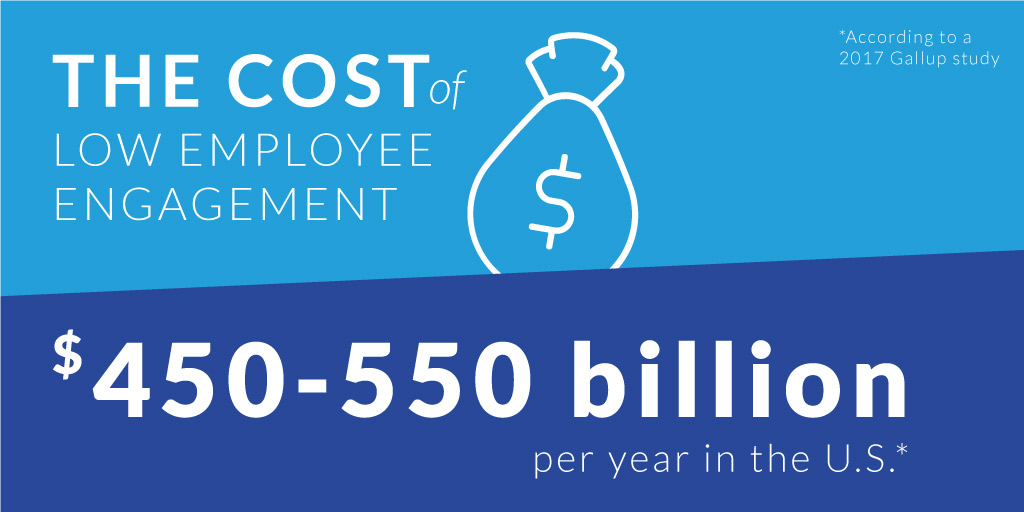How Reactive Management Could Be Hurting Your Employee Morale

Most leaders in corporate America have probably attended a training class or two aimed at improving their leadership skills and boosting employee morale. They may have even invested some personal time in reading self-help books on how to be the best leader.
Yet, at the end of the day, many will find that their behavior has not mirrored those teachings. At the end of the day, employees are still yelled at when things go wrong in the workplace.
At the end of the day, employees still feel unappreciated for working hard. At the end of the day, 16% of American workers are actively disengaged and 51% are not engaged, according to a 2017 Gallup study.
All of those times that leaders’ intentions and actions didn’t match have built up to employee disengagement. Unfortunately, the cost of disengagement is substantial.

The Cost of Low Employee Morale
According to Gallup, “…actively disengaged employees cost the U.S. between $450 billion to $550 billion each year in lost productivity”. That’s B…Billions.
The Gallup survey offers enlightening and frightening data in their publication “State of the American Workplace”. I recommend that every leader spends some time reading it. However, the fact remains that, as an HR practitioner and leadership coach, I still need to address this employee morale crisis.
While the blame for disengagement doesn’t rest solely on leadership’s shoulders, it certainly carries a significant portion of the weight.
Related: How to Plan Motivational Meetings for Your Employees
Finding the Underlying Problem
To get to the heart of these employee morale issues, I often ask some simple questions at the beginning of my training sessions.
Me: “Do any of you begin your day with the intent to make another person’s life miserable?”
Managers: “Of course not.”
Me: “Does it ever still happen even though you don’t intend for it to happen?”
Managers: “Sure it does.”
Me: “Why?”
Managers: “I was having a bad day” or “ I was stressed out about deadlines or company performance” or “My boss just yelled at me and that stuff always runs downhill.”
These are all understandable explanations for why leaders don’t always follow their intent. After all, we are all only human. But these are also reasons why our behavior betrays us.
The Pass-Down Behavior
When encountering unpleasant or undesirable circumstances, we seem to have this primal urge to pass the negativity on to the next closest human being like a game of Hot Potato. In the workplace, the next closest human being includes co-workers and employees under your management.
“At work, we seem to have this primal need to pass our negativity on to the next closest coworker like a game of Hot Potato.”
This negative pass-down behavior runs counter to how most managers envision themselves running the show during calmer times. It’s easy for leaders to talk a big game about creating a healthy work environment. However, once they are exposed to the everyday stress of being a leader, that story changes.
As noted earlier, most leaders don’t begin their day with malicious intent. However, as the stresses of the everyday workplace build up, many leaders find themselves doing exactly what they intended not to do. Because of this, employee morale can take a big hit.

Reaching the Breaking Point
Perhaps it is the dizzying speed at which these pressures accumulate in our fast-paced world. We have lived in this “do-more-with-less” culture for decades. But, contrary to some corporate directives, human beings are not physiologically designed to operate under extended periods of high stress and anxiety.
Related: 5 Easy Ways to Relieve Stress During Your Lunch Break
Because of our design, each human being has a breaking point. For some leaders, one misstep is all it takes for them to lose their cool. Others operate under the cumulative effect method by keeping things bottled up until they explode with a force greater than Mt. Vesuvius.
Regardless, the employees on the receiving end have to put up with and (usually) keep quiet about, this aberrant leadership behavior if they want to keep their jobs. These continuous blows to the employee morale will only lead to an uninspired work environment.
Fixing the Problem
The question that keeps coming back to me is: if you don’t intend to make people’s lives miserable and you are responsible for your own actions in life, why not choose to be true to your intentions?
It can be difficult to do, but none-the-less can be done. The virtual fork in the road of intentions is often overlooked and undervalued. That fork appears in that moment when the pressure builds or the bad news comes down the pipeline. That moment when your pulse quickens and the blood rushes to your head.
In that moment, choose to pause, breathe, and think about the desired outcomes and the positive path you will take to get there. After you have done these small but significant tasks, next choose to consciously respond to situations rather than emotionally react.
Respond, Don’t React
Reacting comes from an emotional state of mind, and responding comes from an analytical state of mind. Consider it an investment in future time conservancy.
If you react to situations using negative, angry, stressed emotions, you will spend so much time later dealing with the fallout and negative outcomes resulting from that behavior.
“If you react to situations using negative emotions, you’ll spend so much time later dealing with the fallout of that reaction.”
However, if you choose instead to pause for a moment and consider thoughtful paths forward, you will enjoy better outcomes on the first try, fewer residual problems, and a generally happier, healthier work environment for you and your employees.
So, you can spend a precious little amount of time now or an exorbitant amount of time fixing the mess later. Seems like a no-brainer, but it takes time, concentrated effort and repeated actions to create a new habit of pausing to think before acting.

Ask for help
Since I fully understand that putting wise words into everyday practices is no easy task, I strongly recommend asking for help from a few close colleagues. They can help hold you accountable and call out the moments in which you fail to pause.
As harsh as it may seem, correcting behavior during the highly emotional moments is the best way to alter that behavior in a positive way. So, instead of allowing your behavior to betray your intent, take control of your emotions at the beginning of the downward spiral and choose purposeful positive responses.
Because let’s face it, the stress will continue to roll downhill just as it always has. The pressure to meet ever greater deadlines with fewer resources will not change in the foreseeable future. So, you aren’t left with many options other than taking control of your response.
“Correcting behavior during the emotional moments is the best way to alter that behavior in a positive way.”
Focus on actions, not intent
Either you choose to own your behavior in those difficult situations or you just continue on the same path of making your life, and the lives of all those you encounter, as miserable as possible. Distasteful as it sounds, our actions and behaviors impact the outcome more than our intent does.
Related: How Vacation Shaming Could Harm Your Employee Performance
As discussed in the beginning of this article, when managers were presented with the negative and unintentional outcome of making people’s lives miserable, they thought those outcomes were terrible and didn’t want to inflict harm on others, unintentional or not.
However, as the saying goes, what matters is when the rubber meets the road. We can find harming others disturbing yet still end up engaging in behaviors that harm other people because we fail to take responsibility for changing our own actions.
Be able to admit fault
When it comes to matching intentions with behaviors, I caution leaders to consider the price of pride. The greatest challenge they may face is confronting their own vulnerability is past mistakes and taking accountability for those mistakes.
Accountability sometimes means swallowing pride and admitting fault through an apology to those who were harmed. Accountability also means leaders need to acknowledge that their actions have outcomes that touch the lives of their employees. If you can do this, your employee morale will thank you for it.
If leaders don’t intend to make the lives of their employees as miserable as possible, then they have a choice to make. It really is that simple.
Your Turn
As a manager, what do you do to keep from reacting negatively on your employees? If you’re an employee, how often do you experience this behavior from your manager(s) and how does it affect your work?
Comment below and start the conversation!

The smartest time tracking tool for businesses
Track employee paid time off use, manage timesheets, and get insights–all in one smart platform.
ABOUT THE AUTHOR…

Dana Hall-Ragland
Dana has a broad




